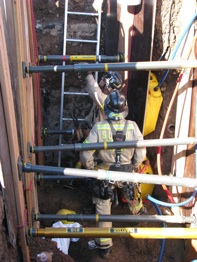Trench Rescue: NFPA 1670 - Awareness Level (TR-AL)
Prerequisite: None.
Duration: Three hours.
This multi-media, open discussion presentation covers all of the requirements needed to bring one’s agency into Awareness Level compliance with Chapter 9 of NFPA’s 1670 standard for trench and excavation rescue. This information allows all department members to safely assist the technical rescue team at the scene of a rescue.

Prerequisite: None.
Duration: Three days.
Trenches are opened on a daily basis. New construction, utility repair, storm drain installation, etc. are regular events in almost every community in the nation. TR-OLS introduces the students to the basic procedures needed to safely handle a single straight trench emergency. At the completion of the course, teams will have met all of the Operations Level requirements outlined in NFPA 1670, Chapter 9.
Trench Rescue: NFPA 1670 Technician Level Skills (TR-TLS)

Duration: Three days.
Designed to meet all of the Technician Level requirements in both NFPA 1670 and 1006, TR-TLS focuses on intersecting trenches and trenches up to 15-feet deep. Building upon the skills and techniques taught in TR-OLS, this course is all hands-on with special attention given to problem solving, scene control and other patent removal options.
Trench Rescue: Advanced Applications (TR-AA)
Prerequisite: TR-TLS
Duration: Two days.
TR-AA is primarily scenario based. Teams are shown new skills to handle unique and challenging collapse situations. A strong emphasis is placed on effective team and scene management, rapid deployment, and the utilization of other heavy rescue disciplines and specialized equipment to effect difficult trench rescues.







